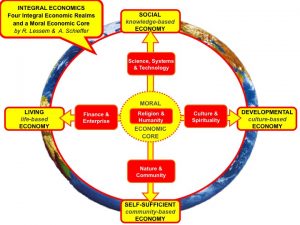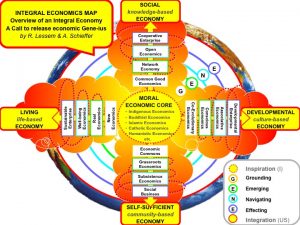Innovation = Regenerating Knowledge | Integral Worlds Theory
Integral Economics Theory:
A Roadmap for Economic Transformation
Integral Economic Theory provides an integrated perspective on cutting-edge economic theory and practice, as well as a transformative process to engage in economic renewal.
Starting Point: The Need to Reinvent an Economic System that works for all
Years ago, after we had completed our work on the Integral Enterprise, we increasingly gained the conviction, that we could not address organisational transformation in isolation of an economic transformation. For micro-organisational transformation is bound to be limited by the macro-economic context to which organisations are required to adapt. This very macro-economic system is failing us to such a degree that we are collectively called upon to seek a more viable alternative. To those who claim that the existing system still works and may only have to be tweaked a bit here and there, we argue that it only works for an elite few, and that the time has come for us to develop an economic systems that works for all of us and for the planet. We regard such a system as a crucial prerequisite for our collective survival.
Our painful observation had been, that after the demise of communism we were caught in one economic world (capitalism) – and with it in one particular western or rather Anglo-Saxon frame of mind. Muhammad Yunus once commented that mainstream free market theory suffers from a conceptualisation failure, a failure to capture the essence of what it is to be human. And indeed this was what some of Britain’s leading economists – among them Geoffrey Hodgson, Paul Ormerod and Bridget Rosewell – admitted in an open letter to the Queen of England in August 2009, after the Queen had publicly posed the question, why economists had not foreseen the financial and economic crisis the world was facing. The following excerpt from their letter is most illuminating.
‘We believe that the narrow training of economists – which concentrates on mathematical techniques and the building of empirically uncontrolled formal models – has been a major reason for this failure in our profession. This defect is enhanced by the pursuit of mathematical technique for its own sake in many leading academic journals and departments of economics. There is a species of judgment, attainable through immersion in a literature or a history that cannot be adequately expressed in formal mathematical models. It’s an essential part of a serious education in economics, but has been stripped out of most leading graduate programs in economics in the world, including in the leading economics departments in the United Kingdom. Models and techniques are important. But given the complexity of the global economy, what is needed is a broader range of models and techniques governed by a far greater respect for substance, and much more attention to historical, institutional, psychological and other highly relevant factors … As trained economists and United Kingdom citizens we have warned of these problems that beset our profession. Unfortunately, at present, we find ourselves in a minority.’
We fully agree with this statement and asked ourselves whether the human mind is indeed not more creative than being restricted to defining economics as an either or between capitalism and communism – another expression of the ‘dualistic disease’ that we were lamenting at the beginning of the book. Was the world – in past and present, and across all cultures – not more inventive than that? We decided to do a thorough analysis and to use our integral and transcultural approach to analyse the economic situation of the world – in theory and in practice. This was the starting point for our work on Integral Economics, a book that we subtitled Releasing the Economic Genius of your Society. For, indeed, the wealth of economic diversity that we encountered made us hopeful that we collectively have the ability to reinvent economics. What is crucial though is that we surface this ‘wealth’, as it is largely hidden from economic classrooms and textbooks.
Towards an Integral Understanding of the Economy: Three Surprising Findings
Touring the world’s economic theory and practice in an integral manner, we had a couple of Eureka moments.
Firstly, we found that if we applied the four integral realms to map economic theory and practice we could clearly see that there was profound economic thinking in each of them. We also noticed that there was an overriding economic theme in each of the four realms, which led us to the following classification:
- The ‘southern’ natural and communal realm promotes the ‘Self-Sufficient community-based Economy’.
- The ‘eastern’ cultural and spiritual realm promotes a ‘Developmental culture-based Economy’.
- The ‘northern’ scientific and technological realm promotes a ‘Social knowledge-based Economy’.
- The ‘western’ realm was promoted in the past through a neoliberal market economy;
but below the surface we can recognise the gradual emergence of what we called a ‘Living life-based Economy’ – which is basically a creative revisiting of the Anglo-Saxon economic model with a strong focus on ecology and sustainability.

Secondly, while such rich economic diversity in theory and practice is arising, the mainstream western model is not only disconnected from this diversity, but is superimposing its model as a universal approach. Such domination of one world over the others leads from an integral perspective to an imbalance of the entire system. That is exactly what we are experiencing in this day and age. The superimposition of the western model, however, also leads to a total sidelining of all other approaches, which often don’t even find their way into the consciousness of seasoned economists. As a consequence, these approaches are not sufficiently interconnected to mutually inform and strengthen each other.
Thirdly, we found a wealth of new economic thinking emerging from the field of ‘religion and humanity’. We placed it in the centre of our model (see Figure), as it provided something like a moral core of economic thought and practice. More precisely, we found a wealth of literature on Indigenous economic thinking, Catholic Economics, Islamic Economics, Buddhist Economics, and on more generally humanistically oriented approaches to economics, among others. Given that present day debates on a required reorientation of economics often focus only on a ‘need for new values’, we tend to overlook that most of our societies are profoundly rooted in religious or humanistic philosophies that go far beyond an articulation of singular values.
The religious rooting is even significantly stronger in the so-called developing world than in the more secular geographic north-west of the world. Indeed, we find that the common (western) understanding of economics has effectively banned religion, humanistic philosophy or spirituality from its territory, unaware of the close original link between market economics and Protestantism. One may well make the point that the current economic system is footloose and lacks anchoring in cultural and societal layers that are deeper than moral codices, a set of values or outer regulations based on them. Furthermore, all of the latter seem to have little effect on overcoming the downsides of the current system. Any fundamental revisiting of economics, so we argue, would need to revisit the relationship between the economy and the moral core of a society, to enable the necessary alignment between the philosophical and ethical inner substance of a society and its practical, outer economic systems and activities.
Building an Integral Economy
The integral and transcultural approach enabled us to provide sufficient space for the rich diversity of innovative economic theory from all four integral realms – as well as from the moral core – that can now help us to gradually rebuild our economies as well as a global economic system. This space is not a closed one, as the body of the theory and practice is continuously evolving. We certainly were also not able to put every approach and their multiple variations on the integral map. Also, we are certainly aware, that any model – and so also ours – has inbuilt structuring principles around which its components are ordered. We thus emphasise, that the map is not the territory. But for the first time, to our mind, a map had been developed that surfaced a huge quantity of the economic variety that the world as a whole had to offer. This transdisciplinary and transcultural economic map allows economic students and social innovators to engage with a rich picture of the economic landscape – a landscape that is designed to stimulate comparison, critique, evolution and innovation as well as to encourage a purposeful rebuilding of our economies. Here we provide a detailed overview of the Integral Economic Map.

The map that we developed is not static. Rather we have developed a transformative rhythm that provides guidance in concretely rebuilding an economy. This so-called GENE-rhythm follows the four-fold transformational rhythm of grounding, emerging, navigating and effecting, designed to release economic gene-ius and is similar to the one we apply in Integral Development. In Integral Economics we illustrate that if we work purposefully through each of the four economic realms and gradually through all of them in a south-east-north-west fashion – informed by the wealth of the moral economic core – we arrive in each realm at practical applications that help us to translate new economic thinking into transformative practice. Here is an illustration of what we mean:
- South: Working through the gene-ius of the ‘southern’ realm of a community-based self-sufficient economy we evolve ‘from profits to profiting society’, and we actively revisit the extent to which our own community or enterprise is participating in building a self-sufficient economy, and thereby contributing locally to alleviate poverty. The role model we surfaced in the ‘southern’ realm is the ‘social business’ and self-sufficiency movement, embodied by Grameen in Bangladesh.
- East: Working through the gene-ius of the ‘eastern’ realm of a culture-based developmental economy we evolve ‘from survival to co-evolution’, and we actively revisit the extent to which our community or enterprise is co-evolving with its multiple stakeholders, thereby becoming an agent for a developmental economy. The role model we surfaced in the ‘eastern’ realm is the developmental enterprise, embodied by Canon in Japan as well as the development movement Sarvodaya in Sri Lanka.
- North: Working through the gene-ius of the ‘northern’ realm of a knowledge-based social economy, we evolve ‘from hierarchy to democracy’, and we actively revisit the extent to which our community or enterprise responds to continuous technological change and social challenges in a cooperative and democratic manner. The role model we surfaced in the ‘northern’ realm is the cooperative enterprise, embodied by Mondragon in Spain, the world’s largest worker’s cooperative and a leader in the social-economic cooperative movement.
- West: Working through the gene-ius of the ‘western’ realm of a life based living economy we evolve ‘from growth to sustainability’, and we actively revisit the extent to which our community or enterprise is modelled upon nature, thereby sustainable and restorative, building up human, natural and financial capital in parallel. The role model we surfaced in the ‘western’ realm is the ‘sustainable enterprise’, embodied by the case of Interface in the USA, a corporate leader within the sustainability movement.
Building on Practice: The Future has already begun
Each of the four integral economic realms helps us to revisit our own practice (the final ‘E’ of the GENE), building on the other three components (G + E + N) of our transformational rhythm.
We present case stories of organisations that integrally embody each particular realm. In our research into relevant practice, we found another astonishing fact. All of the organisations that embodied such new economic practice, engaged simultaneously in developing new theory and realising a new practice. We called them ‘mesa-organisations’ as we see them somewhere in between the micro and the macro economy. They provide powerful orientation for the design of whole new macro-economic systems. It is for that reason that we believe that the future is already in the making, and it is crucial that we simultaneously consult innovative theory and practice. All of the cases we introduce can be seen as developmental agents for society. It is for that reason that we briefly introduce them also in Integral Development, opening thereby the border between economics and development.
Building the Integral Economy: Five Recommendations
Rebuilding local economies – and in the wake contributing to rebuilding the global economy – remains a tall order of immense proportions. In an attempt to provide further guidance to local developmental agents we concluded Integral Economics with five critical success factors:
- Implement an Integral Economic Laboratory as a local Catalyst: This laboratory is at the centre of economic renewal. Its task is to contribute to an integral understanding of economics and to engage itself with the rich diversity of economic theory and practice from all over the world (using the Integral Economic Map). It articulates the particular economic challenges of the specific society it is based in, and it needs to be interlinked with other similar laboratories from all over the world, to stimulate cross-fertilisation.
- Focus on a real Burning Issue and decide on the most relevant of the four Realms to start with.
- Maintain interconnected Focus: The economy does not work mechanically and in linear fashion, but resembles a highly complex living system. Hence, any approach towards economic renewal requires us to build and navigate within an interconnected web of macro and micro, local and global, individual and communal, academic and practical, elements.
- Build an economic Ecosystem: It is important not to act in isolation, but to involve co-creators. It is recommended to build communities of co-creators around burning issues. These communities should be built up so that they form innovation ecosystems, providing the necessary ‘support structure’ for social and economic transformation. In Integral Economics we show, that such an ecosystem is comprised of stewards, catalysts, researchers and facilitators, as well as, what we called a ‘soul force’.
- Join existing local and global Movements for Socio-Economic Transformation: This final success factor involves leveraging our individual, organisational and communal efforts by linking up with local and global movements that are relevant for the particular burning issues on which we are focussing. Such movements provide an important ‘energetic wave’ that we can build on in our efforts.
We notice, how the Integral Economy purposefully integrates the three levels of self, organisation and society: on the level of the self it invites individual transformation agents to concretely engage in the rebuilding of local economies; on the level of the organisation, it acknowledges the existence of so-called mesa-organisations (the cases mentioned above), that serve as living intimations of future economic models; and, on the level of society, it seeks to initiate and articulate new economic frameworks.
Outlook on the Integral Economy
Ultimately, we are required to renew our prevailing macro-economic system. Integral Economics can be regarded as a blueprint for such an endeavour. What makes it ‘practical’, is that the work of rebuilding the economy starts in our own particular contexts. From there we begin our engagement, from there we seek to transform locally and to contribute globally. With the practical cases we demonstrated that we do not need to start from scratch, but that almost all societies hold locally relevant impulses for economic renewal, on which we can build. Integral Economics is designed in that it interconnects innovative theory and practice in a manner that enables us to locally revisit our own theoretical and practical economic foundations, and to engage in a process of gradually releasing the economic gene-ius of our own community and society. Thereby it brings the task of rebuilding our global economy to each of our doorsteps.
This task, however, is only manageable if we locally set up the necessary infrastructure, such as an Integral Economic Laboratory, supportive ecosystems and strong links with local-global movements as well as similar laboratories. If our local engagements are interconnected and if a growing number of people contributes to a new integral theory and practice, we have indeed an opportunity to transform the existing macroeconomic system. The initial map that Integral Economics provides is not the territory, but the more of us apply and evolve it, the more the creative interplay of the rich diversity of the world’s most innovative economic theory and practice can catalyse true change. Then, an integral economy can serve to bring about an Integral Society.
Note: This is a summary of our book Lessem & Schieffer, (2010). Integral Economics: Releasing the Economic Genius of Your Society.
Note: For a concrete application of Integral Economics to a Society, in this case Slovenia, we recommend to read: Piciga, Schieffer & Lessem (2016). Integral Green Slovenia.
